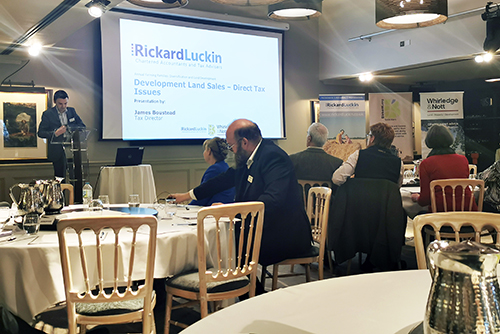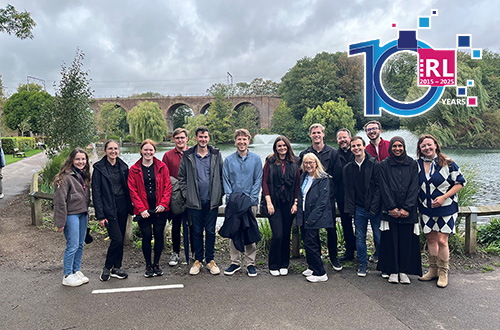We co-hosted an annual farming families seminar for the 10th time in March 2022, with this being the first in-person event since February 2020.
The two overriding themes for this year’s event were diversification and development land. Rickard Luckin Tax Director, James Boustead, focussed his direct tax considerations on development land. For those unable to attend the event, below is a brief summary of the key messages:
-
Although there are lots of variations on what form land sale agreement might look like in a development scenario - including options, promotions and conditional contracts - all of these have the same broad premise of the Capital Gains Tax (CGT) liability not being triggered in full until a later date, typically when planning permission is granted. Given the broad expectation that over the medium-term the UK CGT rate is likely to increase, this has to be a consideration when assessing the net return from these scenarios.
-
All of these types of agreement will often come with a “golden handshake” for entering them, and broadly speaking we would normally see these being taxed as a pure capital gain, i.e. minimal costs to offset against the proceeds. This is because the underlying land has not yet been sold.
It is important to be mindful of consideration structures that could trigger Income Tax (potentially at 45%) rather than CGT (broadly 20% for bare land). For example, overage clauses which are linked to the net sales achieved by a developer or “slice of the action” clauses where a share of developer profits would get paid onto the former landowner. On the other hand, a pure “planning overage” should normally be subject to CGT rather than Income Tax.
-
There are complex CGT rules when it comes to deferred consideration in a sale contract, i.e. land sold now but some of the sum payable is deferred and possibly yet to be determined. Broadly, if it’s a fixed/known amount then however improbable its receipt, the rules are quite onerous and require CGT to be paid up front (unless CGT by instalments can be applied for - which broadly requires the CGT liability to exceed 50% of the amounts actually received to date, and even then it’s only the excess which can be paid over time). Fortunately if those amounts are irrecoverable then a reclaim of the overpaid CGT can be made, potentially several years later.
-
Even more complex are the CGT rules for unknown consideration, which require a “fair value” of the consideration to be included in the CGT computation on “day one”, and then further gains or losses arise each time a payment towards that contingent consideration is received. Given the expectation of CGT rates increasing, we have seen more optimistic values being put on these types of “rights” on more recent transactions, which of course are subject to HMRC enquiry. This type of transaction can create one of the few scenarios where a capital loss is capable of being carried back (as far as the original capital gain on the land).
-
The final core topic that was covered was regarding collaboration agreements, which are becoming more common of late due to a general trend towards larger development sites. A collaboration is where multiple landowners agree to jointly market their land to a developer and share the overall proceeds on a pre-agreed basis; however, how that equalisation is given effect can create unforeseen tax issues.
-
Direct equalisation payments between landowners can create double taxation charges, and putting the emphasis of equalisation onto the purchaser of the land only realistically can solve or partly solve the issue if the land can be sold in one tranche. If it cannot, or should not for commercial reasons, then a more formal pooling arrangement will often be advisable, either in a limited company, a bare trust or (occasionally) an LLP. This is a complex area and collaborations will generally be wise to jointly instruct one advisor to review all of these issues for them.
- As a bridge into the wider topic of succession, it was noted that land development opportunities often stimulate discussion and review of who exactly owns the land, what IHT reliefs would apply if that person passes away with “hope value” on the land, and whether any changes are needed regarding the ownership structure. Ideally this will best be reviewed before entering into any such agreement mentioned above, but occasionally time doesn’t allow and the fall back is to have a clause in the agreement requiring the potential buyer to give automatic permission to a succession decision within the family of the current owners.
For more information on any of these issues, please contact James Boustead or another member of the Tax Team.
This article is from the latest edition of our Agricultural Briefing. To receive future copies of any of our newsletters directly to your inbox, please visit our preference centre to register your interest.
If you have any questions about the above, or would like more information specific to your circumstances, please enter your email address below and we will get in touch:
Related View All
















